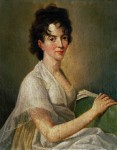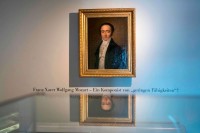 Born on July 26th, 1791, Franz Xaver Mozart was barely four months old when his father Wolfgang Amadeus Mozart breathed his last on December 5th, 1791. He and his older brother Karl Thomas were the only two of Wolfgang and Constanze’s six children to survive to adulthood, and almost from birth he was doomed to carry the burden of his father’s musical genius. Karl showed early promise as a pianist, but avoided the trap of being molded into a crappier version of his father by focusing on the business side. He took on an apprenticeship in a trading company when he was 13 years old with the eventual aim of opening his own piano store. The store never materialized, and instead he built a career in the Austrian civil service in Milan.
Born on July 26th, 1791, Franz Xaver Mozart was barely four months old when his father Wolfgang Amadeus Mozart breathed his last on December 5th, 1791. He and his older brother Karl Thomas were the only two of Wolfgang and Constanze’s six children to survive to adulthood, and almost from birth he was doomed to carry the burden of his father’s musical genius. Karl showed early promise as a pianist, but avoided the trap of being molded into a crappier version of his father by focusing on the business side. He took on an apprenticeship in a trading company when he was 13 years old with the eventual aim of opening his own piano store. The store never materialized, and instead he built a career in the Austrian civil service in Milan.
Alas, Franz was not so fortunate. When he was an infant, his father declared him to be “a true Mozart” because the baby once cried in tune with a piece he was playing on the piano. After Mozart’s death, Constanze poured all her hopes and dreams into little Franz, calling him Wolfgang Amadeus Mozart, Jr., and deciding he would become a composer and musician like his daddy when he was two years old. He was just five years old when his mother sent him on a concert tour to Prague where he stayed with professor and family friend Franz Xaver Niemetschek. There he received his first formal piano lessons.
 Back in Vienna, he took lessons from prominent instructors including Johann Andreas Streicher (piano), Sigismund Neukomm, Georg Joseph Vogler and Johann Georg Albrechtsberger (music composition) and Antonio Salieri (general music training). Still a young child at this point, Franz was under unrelenting pressure to develop as a prodigy the way his father had. You can get a taste of that pressure in this entry Constanze wrote in her nine-year-old son’s autograph book, which should probably go in the encyclopedia under the NO WIRE HANGERS EVER category of mothering philosophies.
Back in Vienna, he took lessons from prominent instructors including Johann Andreas Streicher (piano), Sigismund Neukomm, Georg Joseph Vogler and Johann Georg Albrechtsberger (music composition) and Antonio Salieri (general music training). Still a young child at this point, Franz was under unrelenting pressure to develop as a prodigy the way his father had. You can get a taste of that pressure in this entry Constanze wrote in her nine-year-old son’s autograph book, which should probably go in the encyclopedia under the NO WIRE HANGERS EVER category of mothering philosophies.
“A child that offends his parents, / one that wishes them bad luck, / one that does not seek the blessing of his parents, / will be publicly cursed by God, / His end will be horrible; / He will encounter shame and pain. / This is a warning to my dear Wowi, / from his loving mother / Constance Mozart / Vienna, June 20, 1801.”
(Dear Mom, Thank you for having a very different definition of “loving mother” than Constanze Mozart or, say, Medea. Love you!)
At the age of 13, Franz made his debut in Vienna as a pianist and composer of a cantata. A review published on April 8th, 1805, in Allgemeine musikalische Zeitung, Leipzig, might as well have been a harbinger of doom:
“Young Mozart’s mother presented him to the public, which greeted him with loud applause. He played the great and beautiful piano concert by his father in C major, in a somewhat slow tempo, yet well and with precision. He also showed a lot of potential…. The cantata following the concert was, according to the program, composed by young Mozart for Haydn’s 73rd birthday. It is almost unbelievable that the entire orchestration could be by the boy […] May the well-earned applause that young Mozart received be a double incentive for the budding artist to follow the footsteps of his great father! May he never forget that the name Mozart now grants him clemency, but will
later confront him with high demands and expectations….
Later? He was confronted with those expectations when he was literally in diapers. This was not lost on him at any point. It wasn’t just a question of musical skill either. Reserved and plagued with self-doubt, he couldn’t help but suffer in comparison to his extroverted and confident father.
His old teacher Niemetschek said in his biography of Mozart, Sr., that Franz (then 17 years old) was certainly gifted, but unlike his father, he lacked the firm guidance that Wolfgang’s father Leopold had provided his son, without which his brilliance might never have flourished. “The first fruits of his musical talent have been well received by the public. His piano playing is distinguished by fine expression and precision. […] Apparently, the spirit of his father lives on in him. However, the son is missing an educating fatherly hand like the one that excellently guided and cultivated the genius of his own father.”
In 1808, he turned to teaching to make a living. He moved to Galicia where he taught Count Wiktor Baworowski in Podkamień for a few years before taking a job as piano teacher to Count Tomasz Janiszewski near Lviv in 1811. He would continue to teach the aristocratic families of Galicia for many years, with occasional concert tours and visits to his mother in Salzburg. In 1838 he moved back to Vienna, still employed as teacher and music master for the daughters of the noble Baroni-Cavalcabò family. (Their mother Josephine was his long-time lover.)
Back in his father’s old stomping grounds, Franz was invited to participate in the celebrations of Wolfgang Amadeus’ life and music. In 1839, he was asked to compose a cantata in his father’s honor for the dedication of the Mozart-Monument in Salzburg. He was so insecure about his “lacking ability” (those are his own words), he declined the commission at first. Eventually he took the job, transforming two of Wolfgang Amadeus’ unfinished works (the Offertorium Venite populi and the Adagio for piano) into a cantata he performed at the 1842 dedication of the monument.
In 1841 he was appointed Honorary Music Director of the newly-founded Cathedral Music Association and Mozarteum in Salzburg. Alas, his days were numbered. He died of a “hardening of the stomach,” i.e., stomach cancer, in the Czech spa town of Carlsbad in 1844. On his tombstone was engraved this sad testament: “May his father’s name be his epitaph, as his veneration for him was the essence of his life.”
 In his will, he named Josephine Baroni-Cavalcabò as his sole heiress, but he had told her explicitly before his death that he wanted his personal library and all of his father’s materials — correspondence, autograph manuscripts, music, sketches and family portraits — to go to the Cathedral Music Association and Mozarteum. The successor of that organization, the International Mozarteum Foundation, today owns a great part of the Mozart estate thanks largely to Franz Xaver’s generosity.
In his will, he named Josephine Baroni-Cavalcabò as his sole heiress, but he had told her explicitly before his death that he wanted his personal library and all of his father’s materials — correspondence, autograph manuscripts, music, sketches and family portraits — to go to the Cathedral Music Association and Mozarteum. The successor of that organization, the International Mozarteum Foundation, today owns a great part of the Mozart estate thanks largely to Franz Xaver’s generosity.
Franz Xaver Wolfgang Mozart finally got his own exhibition at the Mozart Residence museum in Salzburg last year. Original documents, letters, and compositions traced Franz’s life on its own terms for a change, and he got the credit he deserved for preserving and bequeathing the rich legacy of Mozartiana that Salzburg is so strongly identified with today.